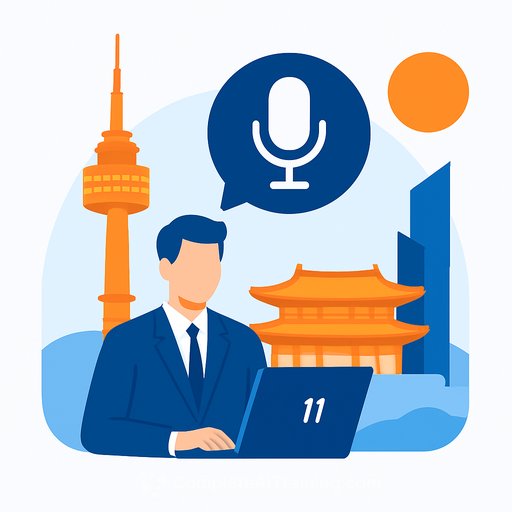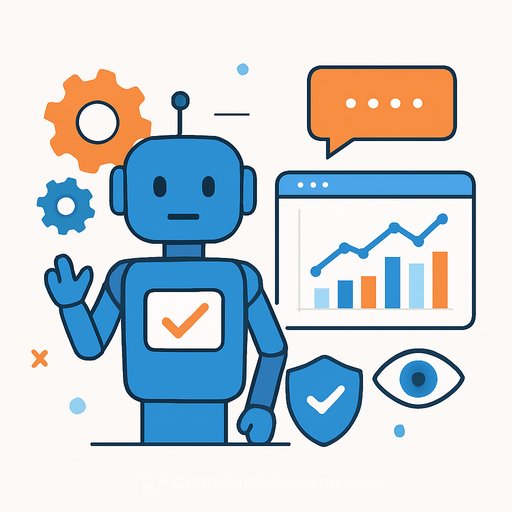ElevenLabs Bets on Korea: What Ops Leaders Should Do Next
Korea's mix of entertainment, policy, and digital infrastructure keeps pulling in top tech. ElevenLabs just doubled down, launching in Seoul and setting up Asia operations with a clear promise: faster voice agents, scalable multilingual support, and production-quality dubbing for global content pipelines.
For operations teams, this isn't hype. It's a concrete path to lower handling time, tighter SLAs, and a cleaner workflow between customer support, payments, and localization.
Quick Facts Ops Teams Care About
- ElevenLabs builds TTS, STT, AI dubbing, and voice cloning; founded in 2022.
- 50M+ monthly users, $6.6B valuation, working with 75% of Fortune 500.
- Partners in Korea include Naver, Krafton, SBS, and ESTsoft.
- Government investment: KRW 10.1T by 2026; 65% of large Korean companies already run AI solutions.
For Customer Operations: Sub-Second, Multilingual, Always-On
The AI Agent Platform hits sub-0.5s latency and connects to CRM and payment systems. That means 24/7 voice support that can authenticate, transact, and hand off when needed.
A European digital bank cut agent handling time by 85% and had AI resolve 50% of card inquiries. Translate that into your numbers: shorter queues, higher first-contact resolution, and smoother peaks without hiring spikes.
Metrics to Track From Day One
- AHT, FCR, deflection rate, queue time, and CSAT by language
- Containment by intent and hour of day
- Escalation accuracy and handoff latency
- Payment success rate, refund accuracy, and dispute callbacks
For Media and Content Ops: Real-Time Dubbing That Scales
The Creative Platform supports 70 languages and 7,000 voices with tone and emotion mapping. This is built for K-content localization at speed, without flattening performance quality.
Set up a pipeline that treats voice like software: version control for voices, prompt/style guides, automated QC, and clear rights management. That keeps releases fast and consistent across regions.
Recommended Localization Workflow
- Ingest scripts and reference audio; lock style and pronunciation guides
- Generate multilingual drafts; run automated checks for timing and lip match
- Human review for emotion and cultural nuance; approve take ranges
- Finalize, watermark, publish; track usage and rights
Governance and Risk Controls
ElevenLabs pushes a 3C Framework: Consent, Control, Compensation. Practically, that's identity verification for voice rights, traceability for where a voice gets used, and revenue flows back to creators. Their marketplace hosts 10,000+ AI voices and has paid out $11M so far.
On your side, embed controls in the intake and publishing steps. Configure consent checks, watermarking, and audit logs. Make it hard to mis-route rights or deploy the wrong voice model.
Security and Compliance Checklist
- PII redaction on transcripts and logs
- Access control by team and environment (prod vs. staging)
- Watermarking/voice provenance on all outputs
- Abuse detection for spoofing and unauthorized cloning
- Retention windows aligned with policy and contracts
Integration Notes for Operations
- Connect voice agents to CRM, ticketing, payments, KMS, and analytics
- Define escalation rules and SLAs by intent and customer tier
- Use clear fallback logic: thresholds for confidence, handoff prompts, and context pass-through
- Instrument everything: events, timestamps, and outcome tags pushed to your BI
ROI Model You Can Defend
- Baseline: AHT, agent cost per hour, call volume by intent and language
- Estimate: containment rate, AHT delta, concurrency vs. agent seats
- Add: licensing, infrastructure, and QA review costs
- Output: cost-per-resolution vs. agent-only benchmark; breakeven volume
Run a 6-8 week pilot on two high-volume, rules-based intents. Validate cost-per-resolution and CSAT before scaling across languages and payment flows.
30/60/90-Day Plan
- Days 1-30: Select intents and languages; integrate CRM and payments; define SLAs and KPIs; build consent and QA steps.
- Days 31-60: Launch limited production; monitor containment, AHT, CSAT; tune prompts and escalation logic; security review.
- Days 61-90: Expand to more intents; add languages; automate QA reports; finalize playbooks and training.
Why Korea Matters for Scale
Near-universal mobile access and strong 5G make Korea a pressure test for latency-sensitive voice systems. Government funding and a mature creative sector turn it into a launchpad for both enterprise CX and global content distribution.
As ElevenLabs builds in Seoul, expect faster iteration loops, stricter ethics guardrails, and broader language coverage. For ops, that means cleaner integrations and standards you can trust in audits.
Final Take
Voice AI is moving from pilot to process. The companies that win will treat it like core infrastructure: clear metrics, predictable SLAs, and governance built into the workflow.
If your roadmap includes multilingual support, payments over voice, or high-volume localization, this is worth a serious look. Set the guardrails, measure the gains, and scale what works.
Helpful Resources
- AI courses by job role to upskill support, media ops, and QA teams
- Automation best practices for building reliable AI-driven workflows
Your membership also unlocks:






